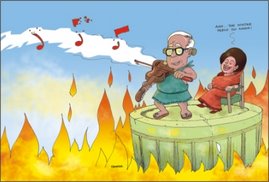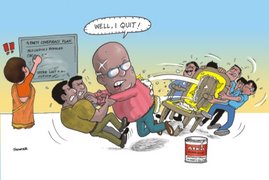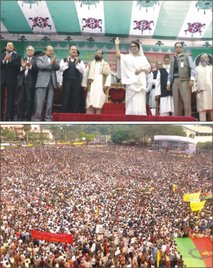 Newly appointed Chief Election Commissioner (CEC), ATM Shamsul Huda yesterday said his first task would be devising an action plan for major electoral reforms in consultation with the political parties and other stakeholders. On the first day in office, he told reporters that he would make the Election Commission (EC) an institution in which every citizen can take pride and that the commission must restore public confidence in it by ensuring transparency in all its activities.
Newly appointed Chief Election Commissioner (CEC), ATM Shamsul Huda yesterday said his first task would be devising an action plan for major electoral reforms in consultation with the political parties and other stakeholders. On the first day in office, he told reporters that he would make the Election Commission (EC) an institution in which every citizen can take pride and that the commission must restore public confidence in it by ensuring transparency in all its activities.Earlier in the day, Huda, former water resources secretary, was sworn in as the CEC while Mohammad Sohul Hossain, another former bureaucrat, as election commissioner. Chief Justice Syed JR Mudassir Husain administered the oath at his Supreme Court chamber in a simple ceremony. The caretaker government on Sunday appointed the two as the CEC and election commissioner.
The new poll chief said he regards the new assignment as a big challenge. Avowing neutrality, he described himself as a man of strict discipline. He hinted at bringing about major changes in the electoral system before holding the ninth parliamentary election that was originally scheduled for January 22 but later cancelled. However he did not mention any time frame for the task ahead. The EC would soon sit in a dialogue with the political parties, civil society and others to seek their opinion about the electoral reforms. Besides, it will keep in contact with the caretaker government, as the EC cannot bring any legal reforms without help of the interim administration.
After taking oath at the Supreme Court building, he told reporters that he would introduce transparent ballot boxes and voter identity cards. Later, at his office he said the EC would not take any decision on its own regarding voter ID cards and the other reform issues. In an oblique reference to the stint of the immediate past EC, he said every stage in the electoral process from voter listing to counting the ballot papers has been rendered controversial. Talking to the reporters, the newly appointed election commissioner, Sohul Hossain, sought cooperation from all.
Controversial CEC Justice MA Aziz stepped down on January 21 while five other commissioners resigned en bloc on January 31, paving the way for reconstitution of the EC. Awami League (AL) yesterday welcomed the appointment of the Chief Election Commissioner (CEC) and an election commissioner and hoped that the new officials will play a neutral role in holding a free and fair election. AL also urged the caretaker government as well as the Election Commission (EC) to change all politically appointed EC officials from EC Secretariat to upazila level to make it a powerful, neutral and independent body.

 Justice MA Aziz
Justice MA Aziz 















